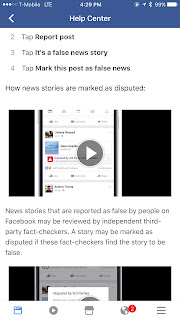As stated in an article by Albany Student Press titled Experts Tackle the Future of Journalism and Fake News, they point out why people are inclined to believe the first thing they read along with providing statistics on the influence of social media with fake news. The most interesting one to me was, 23% of Americans have shared a story with someone that they did not know was false at the time. To tackle fake news in the future we need to create organizations that fact check the internet, journalists that are educated on the information they're reporting on, and an evaluation of fake news analysis in the education system.
Organizations can strengthen both their practices and their reader's trust with transparency. Meedan builds digital tools for global journalism and translation. Meedan is working on Check, a platform to verify digital media being used by Propublica and Amnesty International. Check is a service offered by Meedan. Check combines smart checklists, workflow integrations and design to make digital news gathering an efficient process. Social media-like timeline displays a visible activity log on different news articles and authors. This same service offers a search engine of at least one specific image to find any duplicates on the internet. Meedan has recently been in the media and has been recognized by big name news outlets such as Mousetrap Media Ltd., Nieman Lab, and Fortune.
America expects news outlets to disseminate truthful news but the nation needs the consumers to educate themselves. Previously fake news was comical because people knew it wasn't true. For example, I saw a tabloid the other day that had a picture of Donald Trump with a pregnant stomach and the headline read "PRESIDENT TRUMP EXPECTING ALIEN BABY!!!!" The lines between fake news and reliable sources have been blurred in this day and age. Bloggers and uneducated journalists can lead to the spread of inaccurate information, as well as pushing out trained journalists from their field. Every news outlet wants to be the first one to post the new story with the details they received. This type of pressure puts a stress on the journalists to get the latest big issue or story out as soon as possible.
Some ways fake news can be prevented or can be taken as such, is the education system. If America starts showing middle and high school students that fake news is real and that there are ways to credential the author and/or news outlet, this will begin to stop the nation from believing the first article they see and believing it. The future of fake news is uncertain but with the correct education of future generations, we can curve fake news from being so mainstream.
Imagine a world in the future where services like Check are an Add-on in your internet browser to prevent you from seeing fake news or a fake image. Imagine being brought up to credential your author, not only in regards to fake news, but it will help you when researching for academic purposes.
Facebook is already creating a new feature that allows you to report a post you believe to be fake, or that has false information. As soon as you log into the application, before seeing the normal update from family and friends, you see a big banner that says "Facebook wants to help you combat fake news." Upon clicking on the link they exlpain a few steps to avoid fake news on social media. These steps include being skeptical of headlines, looking closely at URLs, investigating the source, watching for unusual formatting, consider photos, inspect the dates of publishment, checking the author's sources, looking at other reports, and realizing if the story is supposed to be a joke. If you see a story in your news feed that you believe is false you can report it to Facebook. If a story is actually true, you can dispute the article. Articles that are reported go to a third-party fact-checkers. If these fact-checkers find the story to be false, you can go directly to the third-party's website and get more information.

http://www.facebook.com/home/
This is just the beginning of combating fake news, it's Facebook today and internet add-ons tomorrow.


The problem with journalists is that sometimes they don't realize the information is fake.They tend to believe because of the source thinking it's genuine which might be fake. Facebook is doing well, they probably have to advertise it well and educate users more because most people don't know about it just like me.
ReplyDeleteI like the examples you showed. It gives us an idea on how social media networks are trying to improve our reader's knowledge of what is real in the media and what's not.
ReplyDeleteYou did a great job at providing examples to get your point across. I also like how you broke the paragraphs up instead of typing one or two huge paragraphs. Overall, your post was very informative and your punctuation and grammar was very good.
ReplyDelete